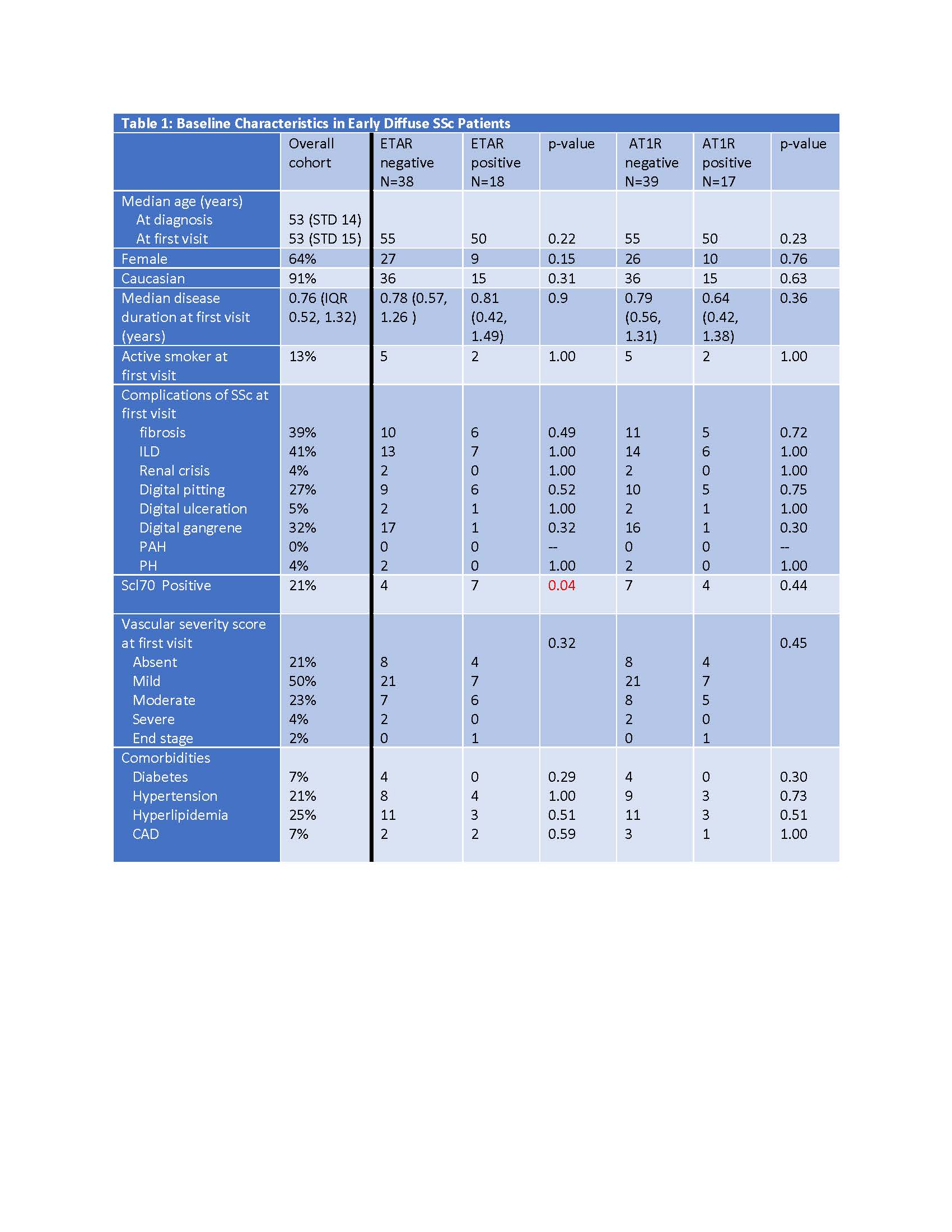Session Information
Date: Tuesday, November 12, 2019
Title: Systemic Sclerosis & Related Disorders – Clinical Poster III
Session Type: Poster Session (Tuesday)
Session Time: 9:00AM-11:00AM
Background/Purpose: Recently, the hypothesis that autoantibodies to the angiotensin II type 1 (AT1R) and endothelian-1 type A (ETAR) receptors are driving the vascular injury and fibrosis in systemic sclerosis (SSc) has gained support from both clinical and basic science research. Cross sectional studies show levels of AT1R and ETAR are associated with increased risk of pulmonary arterial hypertension (PAH), scleroderma renal crisis (SRC) and digital ulcers (DU). Exposure to immunoglobulins from patients with AT1R and ETAR antibodies directly inhibits angiotensin converting enzyme-2 activity and both antibodies induce fibrotic and vasoconstrictive cellular signaling. We hypothesized that the presence of AT1R and ETAR would be associated with the development of vascular complications in an observational cohort of very early diffuse SSc patients followed from their first SSc Center visit.
Methods: Patients with early stage diffuse cutaneous SSc (< 2 years of disease) who were consented to a prospective, observational cohort study at their first visit between 1/1/2009 and 5/15/2014 were included. Patients were followed for at least 5 years with vascular complications noted at each visit, specifically digital pitting, digital ulceration, digital gangrene, SRCand PAH. SSc-associated antibodies were run by immunoprecipitation and immunodiffusion. ELISA assays of AT1R and ETAR (Cell Trend GmbH) were performed on serum samples obtained at the time of first visit. SAS 9.4 (Cary, NC) was used for statistical analysis.
Results:
56 patients were seen over a period of 5 to 10 years with a median of 7 follow-up visits (IQR 2, 11.5). Baseline characteristics are in Table 1. There was no difference in rates of vascular complications at baseline in those positive for ETAR and AT1R antibodies (Table 1). There was no difference in incidence of vascular complications, although digital gangrene approached statistical significance in ETAR positive patients (Table 2). There was a significantly higher frequency of ETAR antibodies in Scl-70 positive patients which is consistent with prior studies.
Conclusion: To our knowledge, this is the first study to use a inception cohort of early diffuse SSc to evaluate for an association between AT1R and ETAR antibody positivity and incident vascular complications. The lack of association between presence of AT1R or ETAR antibodies and either early or new development of vascular complications in early diffuse SSc does not support the hypothesis that the vascular injury that characterize SSc is due to functional AT1R or ETAR antibodies nor support utilizing these autoantibodies as prognostic markers for the development vascular complications.
To cite this abstract in AMA style:
Downer K, Domsic R, Bentlejewski C, Zeevi A, Zhu L. Associations Between Antibodies to the Angiotensin II Type 1 Receptor and Endothelian-1 Type a Receptor and the Incidence of Vascular Complications in Early Diffuse Systemic Sclerosis [abstract]. Arthritis Rheumatol. 2019; 71 (suppl 10). https://acrabstracts.org/abstract/associations-between-antibodies-to-the-angiotensin-ii-type-1-receptor-and-endothelian-1-type-a-receptor-and-the-incidence-of-vascular-complications-in-early-diffuse-systemic-sclerosis/. Accessed .« Back to 2019 ACR/ARP Annual Meeting
ACR Meeting Abstracts - https://acrabstracts.org/abstract/associations-between-antibodies-to-the-angiotensin-ii-type-1-receptor-and-endothelian-1-type-a-receptor-and-the-incidence-of-vascular-complications-in-early-diffuse-systemic-sclerosis/


